FEATURED ARTICLES [Latest news updates]
_100.jpg) March issue of Tropical Conservation Science
March issue of Tropical Conservation Science
(03/29/2010) The March issue of Tropical Conservation Science, mongabay.com's peer-reviewed scientific journal is now online. Included are papers on bat and rodent diversity in Mexico; homegardens in Bangladesh; the influence of human population density on forest cover in Congo, conservation of Colombian primates, conservation of the golden-headed lion tamarin, howler monkeys and a yellow fever outbreak in Brazil, the Sal forest ecosystem of central Bangladesh, and
Wildlife Management Areas in Tanzania [PDFs].
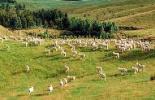 Just how bad is meat-eating for the environment?
Just how bad is meat-eating for the environment?
(03/28/2010) Meat is booming. In the past thirty years, livestock production has increased threefold. In many parts of the world where incomes are expanding, meat, once a delicacy, is now eaten regularly and voraciously. But what are the environmental impacts of this 'livestock revolution'? Two recent studies look at the global impact of the livestock industry, one alleges that its environmental impacts in relation to greenhouse gas emissions has been overestimated, while the other takes a holistic view of the industry's environmental impact.
 Madagascar bans rainforest timber exports following global outcry
Madagascar bans rainforest timber exports following global outcry
(03/25/2010) Under mounting pressure over illegal logging of its national parks, Madagascar's transitional government on Wednesday reinstated a ban on rosewood logging and exports. The decree (no. 2010-141), which prohibits all exports of rosewood and precious timber for two to five years, was announced during a council meeting held yesterday at Ambohitsorohitra Palace in Antananarivo, Madagascar's capital city.
 A new world?: Social media protest against Nestle may have longstanding ramifications
A new world?: Social media protest against Nestle may have longstanding ramifications
(03/20/2010) The online protest over Nestle's use of palm oil linked to deforestation in Indonesia continues unabated over the weekend. One only needed to check-in on the Nestle's Facebook fan page to see that anger and frustration over the company's palm oil sourcing policies, as well as its attempts to censor a Greenpeace video (and comments online), has sparked a social media protest that is noteworthy for its vehemence, its length, and its bringing to light the issue of palm oil and deforestation to a broader public.
 Analysis shows Borneo can say 'no' to coal power
Analysis shows Borneo can say 'no' to coal power
(03/17/2010) Plans for a coal power plant in the Malaysian state of Sabah in northern Borneo have run into stiff opposition. Environmentalists say the coal plant could damage extensive coral reef systems, pollute water supplies, open rainforests to mining, and contribute to global climate change, undercutting Sabah's image as a 'green' destination. The federal government contends that the coal plant is necessary to fix Sabah's energy problems. However, a recent energy audit by the Renewable and Appropriate Energy Laboratory (RAEL) at the University of California Berkeley shows that pollution-intensive coal doesn't have to be in Sabah's future.
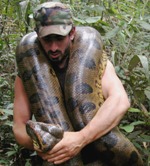 Secrets of the Amazon: giant anacondas and floating forests, an interview with Paul Rosolie
Secrets of the Amazon: giant anacondas and floating forests, an interview with Paul Rosolie
(03/10/2010) At twenty-two Paul Rosolie has seen more adventure than many of us will in our lifetime. First visiting the Amazon at eighteen, Rosolie has explored strange jungle ecosystems, caught anaconda and black caiman bare-handed, joined indigenous hunting expeditions, led volunteer expeditions, and hand-raised a baby giant anteater. "Rainforests were my childhood obsession," Rosolie told Mongabay.com. "For as long as I can remember, going to the Amazon had been my dream […] In those first ten minutes [of visiting], cowering under the bellowing calls of howler monkeys, I saw trails of leaf cutter ants under impossibly large, vine-tangled trees; a flock of scarlet macaws crossed the sky like a brilliant flying rainbow. I saw a place where nature was in its full; it is the most amazing place on earth."
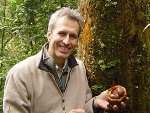 Why seed dispersers matter, an interview with Pierre-Michel Forget, chair of the FSD International Symposium
Why seed dispersers matter, an interview with Pierre-Michel Forget, chair of the FSD International Symposium
(03/07/2010) There are few areas of research in tropical biology more exciting and more important than seed dispersal. Seed dispersal—the process by which seeds are spread from parent trees to new sprouting ground—underpins the ecology of forests worldwide. In temperate forests, seeds are often spread by wind and water, though sometimes by animals such as squirrels and birds. But in the tropics the emphasis is far heavier on the latter, as Dr. Pierre-Michel Forget explains to mongabay.com. "[In rainforests] a majority of plants, trees, lianas, epiphytes, and herbs, are dispersed by fruit-eating animals. […] As seed size varies from tiny seeds less than one millimeters to several centimeters in length or diameter, then, a variety of animals is required to disperse such a continuum and variety of seed size, the smaller being transported by ants and dung beetles, the larger swallowed by cassowary, tapir and elephant, for instance."
 Photos: Madagascar's wonderful and wild frogs, an interview with Sahonagasy
Photos: Madagascar's wonderful and wild frogs, an interview with Sahonagasy
(03/03/2010) To save Madagascar's embattled and beautiful amphibians, scientists are turning to the web. A new site built by herpetologists, Sahonagasy, is dedicated to gathering and providing information about Madagascar's unique amphibians in a bid to save them from the growing threat of extinction. "The past 20 years have seen resources wasted because of a poor coordination of efforts," explains Miguel Vences, herpetologist and professor at the Technical University of Braunschweig. "Many surveys and reports have been produced that were never published, many tourists found and photographed amphibians but these photos were not made available to mapping projects, many studies carried out by Malagasy students did not make use of literature because it was not available."
 Why we are failing orangutans
Why we are failing orangutans
(03/01/2010) It is no secret that orangutans are threatened with extinction because their rain forests are being destroyed at an alarming rate. Ten years ago, Shawn Thompson, a writer, former journalist and university professor, set out to chronicle the threat to orangutans in a book released in March 2010. The book is called The Intimate Ape: Orangutans and the Secret Life of a Vanishing Species. The book spends most of the time talking about the nature of orangutans and the relationships between orangutans and people. But the ultimate underlying message is there about the source of the peril to orangutans and the solution. Thompson says that the problem of saving orangutans has to do with communications and human nature.
 How that cork in your wine bottle helps forests and biodiversity, an interview with Patrick Spencer
How that cork in your wine bottle helps forests and biodiversity, an interview with Patrick Spencer
(03/01/2010) Next time you’re in the supermarket looking to buy a nice bottle of wine: think cork. Although it’s not widely known, the cork industry is helping to sustain one of the world’s most biodiverse forests, including a number of endangered species such as the Iberian lynx and the Barbary deer. Spreading across 6.6 million acres in southern Europe (France, Spain, Portugal, and Italy) and northern Africa (Algeria, Morocco, and Tunisia) oak cork trees Quercus suber are actually preserved and protected by the industry.
Depopulation may be harming the Amazon rainforest
(03/31/2010) Urbanization may be having unexpected impacts in the Amazon rainforest by leaving forest areas vulnerable to exploitation by outsiders, report researchers writing in Conservation Letters.
Sumatran rhino loses pregnancy: conservationists saddened but remain resolute
(03/31/2010) Rhino conservationists' hopes were dampened today by news that Ratu, a female Sumatran rhino, had lost her pregnancy. Just months after the announcement of the pregnancy—the first at Indonesia’s Sumatran Rhino Sanctuary in Way Kambas National Park—Ratu lost the embryo. Still, say conservationists, the very fact that Ratu became pregnant at all should keep hope alive for the beleaguered species.
US gun, guitar, and furniture-manufactures must declare basic information about wood sources
(03/31/2010) In May of last year federal agents raided Gibson Guitar headquarters in Nashville, Tennessee after they received information that the guitar-giant was using illegally logged rosewood from Madagascar in the construction of their musical instruments. The scandal forced Gibson's CEO to take a leave of absence as a member of Rainforest Alliance.
First-ever photo of rare and spectacular hummingbird from Colombia
(03/31/2010) A conservationist has taken the first-ever photos of a living Santa Marta Sabrewing (Campylopterus phainopeplus) in the El Dorado Nature Reserve in the Sierra Nevada de Santa Marta in Colombia, reports ProAves, a bird conservation group.
Rockhopper penguins benefit from new park in Argentina
(03/31/2010) Southern rockhopper penguins (Eudyptes chrysocome) are easily distinguished by the spiked plumes on their head, their neon-yellow eyebrows, and red eyes. But these wild-looking penguins are also endangered: the IUCN Red List classifies them as Vulnerable to extinction due to pollution and drowning by fishing nets.
Indonesia to establish rainforest trust fund
(03/30/2010) Indonesia is preparing to establish a trust fund to reduce deforestation, reports the Jakarta Globe.
 When it comes to Yellow Fever, conserving howler monkeys saves lives
When it comes to Yellow Fever, conserving howler monkeys saves lives
(03/29/2010) Abundant and diverse wildlife help people in many ways: for example bees pollinate plants, birds and mammals disperse seeds, bats control pest populations, and both plants and animals have produced life-saving medicines and technological advances. But how could howler monkeys save people from a Yellow Fever outbreak? A new study in the open-access journal Tropical Conservation Science explores the link between howler monkeys, mosquitoes, and humans during a recent yellow fever outbreak in the state of Rio Grande do Sul, Brazil.
 Yellowstone Country As Seen from the Heart Mountain Trail
Yellowstone Country As Seen from the Heart Mountain Trail
(03/29/2010) Yellowstone National Park in northwest Wyoming has the distinction of being the first of its kind—a federally set-aside space meant for preservation and enjoyment by American and international visitors alike. Its geologic wonders and abundant wildlife attract millions of visitors each year. Some of the best kept secrets of the region, however, lay just outside Yellowstone’s borders. About sixty miles to the east of the national park, jutting out from the floor of an otherwise dry and desolate stretch of plain, is Heart Mountain. An extensive ring of mountain ranges encircle the Big Horn Basin, home to towns of Cody, Powell, and Clark, WY. A Japanese internment camp, Heart Mountain Relocation Center, once housed over 11,000 detainees during World War II. Its remnants rest at the foot of the towering rocky surface that shares its name.
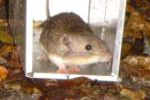 Diverse habitats needed for survival of small mammals in Mexico
Diverse habitats needed for survival of small mammals in Mexico
(03/29/2010) A new study in Tropical Conservation Science shows that small tropical mammals in Mexico—bats and rodents—require a variety of habitats to thrive. Surveying mammal populations in the Isthmus of Tehuantepec, Oaxaca, Mexico, researchers found that sites comprising the greatest habitat diversity carried also the greatest diversity of rodents. In turn bats lived in all variety of habitats and moved easily from one to another.
Population density corresponds with forest loss in the Congo Basin
(03/29/2010) Africa's greatest rainforest ecosystem, the Congo Basin, has undergone significant deforestation and degradation during the past century. A new study in the open access journal Tropical Conservation Science examined whether or not there was a connection between population density and forest loss.
More research and conservation efforts needed to save Colombia's monkeys
(03/29/2010) Approximately thirty monkey species inhabit the tropical forests of Colombia with at least five found no-where else in the world. A new review appearing the open access journal Tropical Conservation Science of Colombia's primates finds that a number of these species, including some greatly endangered species, have been neglected by scientists. The researchers looked at over 3,500 studies covering over a century of research by primatologists.
 Finding forest for the endangered golden-headed lion tamarin
Finding forest for the endangered golden-headed lion tamarin
(03/29/2010) Brazil's golden-headed lion tamarin is a small primate with a black body and a bright mane of gold and orange. Listed as Endangered by the IUCN Red List, the golden-headed lion tamarin (Leontopithecus chrysomelas) survives in only a single protected reserve in the largely degraded Atlantic Forest in Brazil. Otherwise its habitat lies in unprotected patches and fragments threatened by urbanization and agricultural expansion. Currently, a natural gas pipeline is being built through prime tamarin habitat.
Mapping the landscape of NGOs working to protect forests
(03/29/2010) A new report published by the UK Environmental Funders Network maps out the civil society organizations working to address deforestation.
Women in Bangladesh help biodiversity with homegardens
(03/29/2010) Overpopulated, largely poor, and environmentally degraded, the nation of Bangladesh has known its share of woes. Yet even in face of struggles, including a forest loss of over 90 percent, the women of Bangladesh are aiding the country's struggling people and biodiversity through the establishment of some 20 million homegardens. Long-neglected by the government and NGOs, these homegardens provide food, firewood, and medicine.
Last chance to save Bangladeshi forest: 90 percent of the Sal ecosystem is gone
(03/29/2010) Considered the most threatened ecosystem in Bangladesh, the moist deciduous Sal forest (Shorea robusta) is on the verge of vanishing. In 1990 only 10 percent of the forest cover remained, down from 36 percent in 1985 according to statistics from the Food and Agricultural Organization (FAO). A new study in the online open-access journal Tropical Conservation Science looks at the threats posed to the Shal forest and ways in which it may still be saved.
 Wildlife Management Areas in Africa require changes to become sustainable
Wildlife Management Areas in Africa require changes to become sustainable
(03/29/2010) Wildlife Management Areas in Africa were created to serve a dual purpose. By granting local communities usage rights over wildlife in designated areas, African countries hoped both to allow communities to benefit from their wildlife while taking an active part in conservation. A new paper in published in the open access journal Tropical Conservation Science outlines the current problems facing WMAs, using Tanzania as an example, and recommends possible solutions.
BPA not just in food and water, but contaminating the ocean
(03/28/2010) Increasingly consumers are concerned about the chemical bisphenol A or more-widely known as BPA, which is present in certain plastics. The chemical is capable of leaching from plastic containers and liners into our food and drink. But now there's a new place BPA has shown up in surprisingly high concentrations: the world's oceans. Scientists have discovered that despite being known for their hardness, polycarbonate plastics actually decompose in oceans, leaching chemicals, including BPA, throughout the marine ecosystem.
'Very dramatic' changes in Greenland: ice loss spreads north
(03/28/2010) Over the past ten years scientists have measured increasing ice loss along southern Greenland. Now a new study in Geophysical Research Letters shows that the ice loss has spread north with likely consequences for global sea level rise.
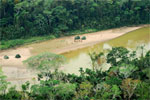 Spanish oil company develops own rules for contacting uncontacted Amazon tribes
Spanish oil company develops own rules for contacting uncontacted Amazon tribes
(03/26/2010) Imagine you're in one of the remotest parts of the Amazon rainforest and suddenly you come across members of an uncontacted tribe. What should you do? The experts say, "Turn around. At all costs, make no attempt at contact." Repsol YPF, exploring for oil in northern Peru, has taken a different approach. Despite the extreme vulnerability of the tribes to any form of contact, the company suggests that its workers talk to them in certain instances, and even provides specific phrases to use and conversation topics to address.
 Nestle's palm oil debacle highlights current limitations of certification scheme
Nestle's palm oil debacle highlights current limitations of certification scheme
(03/26/2010) Last week Nestle, the world's largest food processor, was caught in a firestorm when it attempted to censor a Greenpeace campaign that targeted its use of palm oil sourced from a supplier accused of environmentally-damaging practices. The incident brought the increasingly raucous debate over palm oil into the spotlight and renewed questions over an industry-backed certification scheme that aims to improve the crop's environmental performance.
Guerrillas could drive gorillas toward extinction in Congo, warns UN
(03/25/2010) Gorillas may disappear across much of the Congo Basin by the mid 2020s unless action is taken to protect against poaching and habitat destruction, warns a new report issued by United Nations and INTERPOL.
 Global deforestation slows
Global deforestation slows
(03/25/2010) Global forest loss has diminished since the 1990s but still remains "alarmingly high", according to a preliminary version of a new assessment from the U.N. Food and Agriculture Organization (FAO). The report, Global Forest Resources Assessment 2010 (FRA 2010), shows that global forest loss slowed to around 13 million hectares per year during the 2000s, down from about 16 million hectares per year in the 1990s. It finds that net deforestation declined from about 8.3 million hectares per year in the 1990s to about 5.2 million hectares per year in the 2000s, a result of large-scale reforestation and afforestation projects, as well as natural forest recovery in some countries and slowing deforestation in the Amazon.
Photo: Camouflage expert discovered in Cambodia
(03/25/2010) Researchers have discovered a cryptic species of gecko in the Cardamom Mountains of Cambodia, reports Fauna & Flora International (FFI), a conservation group that operates in the region.
Half of Indonesia's mangroves gone in less than thirty years
(03/23/2010) The Jakarta Post reports that, according to the local NGO People’s Coalition for Justice in Fisheries (Kiara), Indonesia's has lost 2.2 million hectares of mangroves in less than thirty years, going from covering 4.2 million hectares in 1982 to just 2 million hectares today.
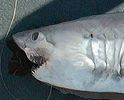 CITES chooses 'commerce' over sharks, leaving endangered species vulnerable
CITES chooses 'commerce' over sharks, leaving endangered species vulnerable
(03/23/2010) Only the porbeagle shark received protection today from the Convention on International Trade in Endangered Species (CITES). Seven other shark species failed to win international protection despite plummeting populations due to overfishing. Once again, Japan led the opposition to regulating the trade in white-tipped sharks and scalloped hammerheads, including two look-alike species: the great hammerhead and the smooth hammerhead. Japan has dominated the CITES meeting, successfully leading resistance to banning the trade in the Critically Endangered Atlantic bluefin tuna and against monitoring the coral trade.
 Nestle fiasco continues: Indonesian oil palm planters threaten boycott too
Nestle fiasco continues: Indonesian oil palm planters threaten boycott too
(03/23/2010) Candy and food giant Nestle is finding itself between a rock and a hard place. The online campaign against Nestle continues: today protesters once again posted thousands of negative messages on the company's Facebook page, most demanding that Nestle cut out palm oil linked to deforestation from its products. At the same time, a new problem has cropped up for Nestle: Indonesian oil palm planters are threatening to boycott Nestle products. Proving that the issues surrounding oil palm and deforestation are nothing if not complex: Facebook protestors say they will boycott Nestle if it doesn't cut out all links to Sinar Mas, a company that Greenpeace has linked to deforestation, whereas the Indonesia Palm Oil Growers Association are preparing a boycott if Nestle stops buying from Sinar Mas, according to the Jakarta Post.
Rise in poaching pushes CITES to vote 'no' to ivory sales
(03/22/2010) The Convention on International Trade in Endangered Species (CITES) has pleased conservationists with its decision to not allow the one-off sales of ivory from government stockpiles in Tanzania and Zambia given the recent rise in elephants poaching in Africa.
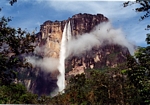 El Niño in Venezuela: Hugo Chávez’s "Katrina" Moment?
El Niño in Venezuela: Hugo Chávez’s "Katrina" Moment?
(03/22/2010) Venezuelan President Hugo Chávez has been in power for more than ten years, during which time he has deflected numerous electoral challenges, a recall effort, a coup d’etat and even an oil lock out. A politically adroit statesman, he has demonstrated enormous staying power throughout all these political crises. Yet, Chávez’s luck may have finally run out: a devastating El Niño-linked drought has recently ravaged Venezuela and the government has been forced to undertake conservation measures for water and electricity. Hardly amused, some are holding Chávez responsible for the energy crunch and the drought could exact a heavy toll on the Venezuelan president in September’s legislative elections.
Scientists discover world's first amphibious insects: Hawaiian caterpillars
(03/22/2010) Scientists have never before discovered a truly amphibious insect until now: writing in the Proceedings of the National Academy of Sciences researchers have announced the discovery of 12 species of Hyposmocoma moths in the Hawaiian islands which they consider truly amphibious—that is a species able to survive both on land and underwater indefinitely.
Drought crippling southwest China, millions without drinking water
(03/22/2010) Over 50 million people are affected by a severe drought in southwest China, according to Xinhua, the nation's state media. The lack of rain and unseasonably high temperatures has also left 16 million people without easy access to drinking water.
CITES rejects monitoring of coral trade
(03/21/2010) After denying protection to polar bears, sharks, and the Critically Endangered Atlantic bluefin tuna, the Convention on International Trade in Endangered Species (CITES) has today voted against additional protections for harvested coral species, according to TRAFFIC, a wildlife trade monitoring group. The joint US and EU measure would have put in place scientific and trade monitoring of over thirty species of red and pink coral in the Mediterranean and western Pacific.
Video: Nestle's attempt to censor Greenpeace palm oil ad backfires
(03/19/2010) In a bold online video, the environmental group Greenpeace cleverly links candy-giant Nestle to oil palm-related deforestation and the deaths of orangutans. Clearly angered over the video, Nestle struck back by having it banned from YouTube and replaced with this statement: "This video is no longer available due to a copyright claim by Société des Produits Nestlé S.A." However Nestle's reaction to the video only spread it far and wide (see the ad below): social network sites like Twitter, Facebook, and Reddit were all flooded with the ad as well as rising criticism against Nestle—one of the world's largest food producers—including calls for boycotts.
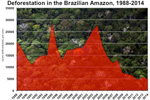 Scientists: new study does not disprove climate change threat to Amazon
Scientists: new study does not disprove climate change threat to Amazon
(03/19/2010) Recently, Boston University issued a press release on a scientific study regarding the Amazon's resilience to drought. The press release claimed that the study had debunked the Intergovernmental Panel on Climate Change's (IPCC) theory that climate change could turn approximately 40 percent of the Amazon into savanna due to declining rainfall. The story was picked up both by mass media, environmental news sites (including mongabay.com), and climate deniers' blogs. However, nineteen of the world's top Amazonian experts have issued a written response stating that the press release from Boston University was "misleading and inaccurate".
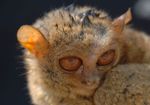 The Asian Animal Crisis
The Asian Animal Crisis
(03/18/2010) The United Nation declared 2010 as the International Year of Biodiversity (IYB). One of the goals of the IYB is to celebrate the achievements of the Convention of Biological Diversity signed by 192 countries since 1992. But what have we accomplished since 1992? Did we put an end to biodiversity loss? The truth is that there is not much to celebrate at all. Asia is a perfect example where the animal crisis and the loss of biodiversity have worsened over decades. The first question that should come to mind is: how many species have vanished in Asia because of human activities? Records of recently extinct species in Asia show 71 species that have disappeared in the wild. Examples include the Yunnan lake newt (Cynops wolterstorffi) from China, the Bonin thrush (Zoothera terrestris) from Japan, or the redtailed black shark (Epalzeorhynchos bicolor) from Thailand.
Critically Endangered bluefin tuna receives no reprieve from CITES
(03/18/2010) A proposal to totally ban the trade in the Critically Endangered Atlantic bluefin tuna failed at the Convention on International Trade in Endangered Species (CITES), surprising many who saw positive signs leading up to the meeting of a successful ban.
 High Arctic species plummeting across the board, others Arctic residents on the rise
High Arctic species plummeting across the board, others Arctic residents on the rise
(03/18/2010) Between 1970 and 2004 species populations in the high Arctic have declined by 26 percent, according to the first report by the Arctic Species Trend Index (ASTI). While this may be a natural cycle, scientists are concerned that environmental impacts such as climate change are worsening natural population fluctuations in the high Arctic. Declining species include lemmings, red knot, and caribou. "Rapid changes to the Arctic’s ecosystems will have consequences for the Arctic that will be felt globally. The Arctic is host to abundant and diverse wildlife populations, many of which migrate annually from all regions of the globe. This region acts as a critical component in the Earth’s physical, chemical, and biological regulatory system," lead-author Louise McRae from the Zoological Society of London (ZSL) said in a press release.
Sharks lose out at UN meeting
(03/17/2010) An effort to bolster conservation measures for plummeting shark populations was defeated yesterday at the Convention on International Trade in Endangered Species (CITES), according to the AP. The nonbinding measure would have increased transparency in the shark trade and produced research on illegal fishing for sharks.
Indonesia opens protected rainforests to mining and other developments
(03/16/2010) Indonesian President Susilo Bambang Yudhoyono has issued new regulations, which will allow underground mining in protected areas, according to the Jakarta Post. The new rules will also allow power plants, renewable energy, and transportation such as toll roads in protected forests.
 Forgotten Species: the marooned pygmy three-toed sloth
Forgotten Species: the marooned pygmy three-toed sloth
(03/16/2010) Many people consider tropical islands mini-paradises: sanctuaries cut-off from the rest of the world. Some species flourish on islands for the same reason. With few predators and a largely consistent environment, once a species has comfortably adapted to its habitat there's little to do but thrive. That is until something changes: like humans showing up. Changes in confined island ecosystems often have large and rapid impacts, too fast and too big for marooned species to survive.
Video: no sunlight, no food, frozen conditions, but NASA finds complex life
(03/16/2010) In a discovery at the bottom of the world that could have implications on the search for extraterrestrial life, researchers were astounded to find an amphipod swimming beneath a massive Antarctic ice sheet.
 Amazon confusion: new research shows forest is resilient to drought, but is this the whole picture?
Amazon confusion: new research shows forest is resilient to drought, but is this the whole picture?
(03/15/2010) A drought that happens once in a hundred years had little negative or positive effect on the Amazon rainforest according to a NASA funded study in Geophysical Research Letters. "We found no big differences in the greenness level of these forests between drought and non-drought years, which suggests that these forests may be more tolerant of droughts than we previously thought," said Arindam Samanta, the study's lead author from Boston University.
Environmental groups call on Delmas to cancel shipment of illegally logged wood from Madagascar
(03/15/2010) Pressure is building on the French shipping company Delmas to cancel large shipments of rosewood, which was illegally logged in Madagascar during the nation's recent coup. Today two environmental groups, Global Witness and the Environmental Investigation Agency (EIA) called on Delmas to cancel the shipment, which is currently being loaded onto the Delmas operated ship named 'Kiara' in the Madagascar port of Vohemar.
 Falklands Dispute: Argentine Sovereignty Won’t Solve the Problem
Falklands Dispute: Argentine Sovereignty Won’t Solve the Problem
(03/15/2010) With Britain now moving to explore for oil and gas in the Falkland Islands, Argentina has cried foul. Buenos Aires claims that the Falklands, or the Malvinas as Argentines refer to the islands, represent a "colonial enclave" in the south Atlantic. The islands have been a British possession since 1833, and the local inhabitants consider themselves thoroughly British. Yet, Argentina claims the Malvinas as the country inherited them from the Spanish crown in the early 1800s. In 1982 Argentina seized the islands but was later expelled by a British naval force. The war was short but bloody, costing 650 Argentine and 250 British lives.
 Thousands of tons of illegal timber in Madagascar readied for export
Thousands of tons of illegal timber in Madagascar readied for export
(03/13/2010) As the President of France, Nicholas Sarkozy, argues in Paris that more funding is needed to stop deforestation and mitigate climate change, a shipment of illegal rosewood is being readied for export in Madagascar by a French company with the tacit approval of the French government.
US Congressman pushes for bird-friendly buildings
(03/11/2010) Birds may see pleasanter skies in the US soon, if Congressman Mike Quigley has his way. Quigley, a democrat from Illinois, has introduced legislation that would require all federal buildings to become bird-friendly, potentially saving the lives of millions of birds every year.
Sharks swim safe around the Maldives
(03/11/2010) Sharks that dwell in the Maldives can breathe a sigh of relief: the island nation has declared 90,000 square kilometers of the Indian Ocean a safe-haven for sharks, banning shark fishing as well as any trade in shark fins.
Flower farms may be killing Kenya's Lake Naivasha
(03/10/2010) Heavily polluted and shrinking, Lake Naivasha is in dire trouble. Environmentalists say the cause is clear: flower farms. Some 60 flower farms line the entire lakeside, growing cut flowers for export largely to the EU. While the flowers industry is Kenya's largest horticultural export (405.5 million last year) it may have also produced an environmental nightmare.
Orangutans use calls for a variety of reasons
(03/10/2010) Mature male orangutans produce what scientists call 'long calls', which can be heard for one kilometer in all directions even in dense forests. New research in Ethology has uncovered that these calls are employed for a number of reasons and provide information about who is calling and why.
Extinction outpaces evolution
(03/09/2010) Extinctions are currently outpacing the capacity for new species to evolve, according to Simon Stuart, chair of the Species Survival Commission for the International Union for the Conservation of Nature (IUCN).
Flash flood sweeps away elephant research camp in Kenya
(03/08/2010) A research camp with environmental organization Save the Elephants (STE) in Samburu National Reserve in Kenya fell victim to a flash flood last week, after the Ewaso Ng’iro River broke its banks. Fortunately, none of the researchers or employees were hurt, but the camp lost most of the equipment—including tents, food, computers, and collars—and data in the flood.
Consumption habits cause rich countries to outsource emissions
(03/08/2010) Over a third of the greenhouse gas emissions related to the consumption of goods in wealthy nations actually occur in developing countries, according to a new analysis by researchers with the Carnegie Institution. Annually, each person if the United States outsources 2.5 tons of carbon due to consumption habits, most frequently in China. In Europe the figure of 'outsourced' emissions rises to 4 tons per person.
New cuttlefish discovered in India
(03/08/2010) A new species of cuttlefish has been discovered on the Southern tip of India, according to The Hindu. Discovered in Tamil Nadu, along the coast of the town of Colachel, the species has been named sepia vecchioni.
Frog in Australia goes from 'extinct' to very, very endangered
(03/08/2010) Facing habitat loss, pollution, climate change, and the devastating chytrid fungus, there has been little positive news about amphibians recently. However, a story out of Australia brings a much needed respite from bad news. In 2008 Luke Pearce, a fisheries conservation officer, stumbled on a frog that had been thought to be extinct for over thirty years. Not recorded since the 1970s, Pearce rediscovered the yellow-spotted bell frog (Litoria castanea) on rural Australian farmland in the Southern Tableland of New South Wales.
U.S. and Brazil sign deforestation agreement
(03/07/2010) Brazil and the United States have signed an agreement to worth together to reduce deforestation as part of an effort to slow climate change.
Website seeking 'most wanted' photos and videos of vanishing species
(03/04/2010) Many of the world's most endangered species have never been photographed or caught on film. The not-for-profit website ARKive is hoping to change that. ARKive provides a collection of some of the best photos and video clips of the world's species.
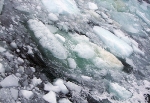 Massive methane leak in Arctic could trigger abrupt warming
Massive methane leak in Arctic could trigger abrupt warming
(03/04/2010) Methane, a greenhouse gas 30 times more potent than carbon, is spewing from what was believed to be an impermeable barrier in Siberia in amounts equal to methane releases from the world's oceans. The discovery has lead researchers to fear the possibility of abrupt climate warming. According to the study published in Science, subsea permafrost below the East Siberian Arctic Shelf has become compromised, leaking vast amounts of methane into the atmosphere.
Octopus pretends to be flounder to avoid predators
(03/04/2010) Marine researchers have discovered the Atlantic longarm octopus mimicking not only the color and appearance of the peacock flounder, but also its unique style of swimming in order to convince predators it's something it's not.
 Healthy coral reefs produce clouds and precipitation
Healthy coral reefs produce clouds and precipitation
(03/03/2010) Twenty years of research has led Dr. Graham Jones of Australia's Southern Cross University to discover a startling connection between coral reefs and coastal precipitation. According to Jones, a substance produced by thriving coral reefs seed clouds leading to precipitation in a long-standing natural process that is coming under threat due to climate change.
Australia pledges $30m to reduce deforestation in Sumatra
(03/03/2010) Australia will contribute A$30 million to a project to reduce deforestation in the province of Jambi, on the Indonesian island of Sumatra, reports Reuters.
National parks in India and Nepal hit by rhino poachers
(03/02/2010) The rare Indian rhinoceros is not safe from poachers even in national parks. In Nepal's world renowned Royal Chitwan National Park, twenty-four Indian rhinos (Rhinoceros unicornis) have been poached since the last census was taken in 2008. The most recent one was killed last Thursday. Approximately 372 Indian rhinos survive in the park, and the population is in decline.
Afghanistan protects 15 additional endangered species
(03/02/2010) Afghanistan's National Environment Protection Agency (NEP) has added 15 species to its Protected Species List, totaling 48 species now under protection. The new species includes the large-billed reed warbler, which was only recently discovered in the Central Asian nation. Fortunately, by law newly discovered species in Afghanistan receive automatic legal protection.
Oil palm plantations support fewer ant species than rainforest
(03/02/2010) Oil palm plantations support substantially less biodiversity than natural forests when it comes to ant species, reports new research published in Basic and Applied Ecology. Tom Fayle, a University of Cambridge biologist, and colleagues sampled ant populations in Danum Valley Conservation Area, a rainforest, and nearby oil palm plantations in Sabah, a state Malaysian Borneo. The researchers counted 16,000 worker ants from 309 species in the natural forest but only in 110 species at the oil palm plantation.
UN mulls global environment organization
(03/02/2010) Mass extinction, ocean acidification, deforestation, pollution, desertification, and climate change: the environmental issues facing the world are numerous and increasingly global in nature. To respond more effectively, the United Nations is considering forming a World Environmental Organization or WEO, similar to the World Trade Organization.
Madagascar traders ready $50m shipment of illegally logged rainforest timber
(03/02/2010) Traders in Vohemar, a port in northeastern Madagascar, are preparing for to ship $54 million worth of timber illegally logged from the Indian Ocean island nation's rainforest parks, report local sources.
 Prehistoric snake gobbled-up dinosaur babies
Prehistoric snake gobbled-up dinosaur babies
(03/02/2010) A fossilized snake has been discovered inside a titanosaur nest in India, leading researchers to conclude that the snake fed on newly-hatched dinosaur babies, rather than their eggs like modern snakes. Paleontologist and snake expert Jason Head says that the snake, known as Sanajeh indicus, lacked the wipe-jaws needed to swallow eggs, but just-hatched baby titanosaurs would have been perfect prey for the 3.5 meter (nearly 12 feet) long serpent. Titanosaurs belong to the sauropods, long-necked herbivorous dinosaurs which includes the world's largest animals to ever walk the land.
Common pesticide changes male frogs into females, likely devastating populations
(03/01/2010) One of the world's most popular pesticides, atrazine, chemically castrates male frogs and in some instances changes them into completely functionally females, according to a new study in the Proceedings of the National Academy of Sciences. The authors conclude that atrazine likely plays a large, but unsuspected role in the current global amphibian crisis.
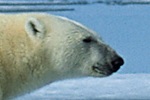 Polar bears are newcomers on the world stage
Polar bears are newcomers on the world stage
(03/01/2010) One of the most well-known animals, the polar bear, is a newcomer on the world stage, according to research published in the Proceedings of the National Academy of Sciences. By studying the DNA of an ancient polar bear jawbone uncovered in 2004 in Norway scientists have for the first time pinpointed the time when the polar bear split from its closest relative, the brown bear.
Most popular mongabay news articles in February
(03/01/2010) A proposal to end Madagascar's logging crisis was the most popular news story in February, followed by the E.U.'s pending decision to classify oil palm plantations as natural forests, sanctioning large-scale conversion of rainforests for "sustainable" biofuel production.
_100.jpg) March issue of Tropical Conservation Science
March issue of Tropical Conservation Science Just how bad is meat-eating for the environment?
Just how bad is meat-eating for the environment?  Madagascar bans rainforest timber exports following global outcry
Madagascar bans rainforest timber exports following global outcry A new world?: Social media protest against Nestle may have longstanding ramifications
A new world?: Social media protest against Nestle may have longstanding ramifications  Analysis shows Borneo can say 'no' to coal power
Analysis shows Borneo can say 'no' to coal power Secrets of the Amazon: giant anacondas and floating forests, an interview with Paul Rosolie
Secrets of the Amazon: giant anacondas and floating forests, an interview with Paul Rosolie Why seed dispersers matter, an interview with Pierre-Michel Forget, chair of the FSD International Symposium
Why seed dispersers matter, an interview with Pierre-Michel Forget, chair of the FSD International Symposium Photos: Madagascar's wonderful and wild frogs, an interview with Sahonagasy
Photos: Madagascar's wonderful and wild frogs, an interview with Sahonagasy Why we are failing orangutans
Why we are failing orangutans How that cork in your wine bottle helps forests and biodiversity, an interview with Patrick Spencer
How that cork in your wine bottle helps forests and biodiversity, an interview with Patrick Spencer When it comes to Yellow Fever, conserving howler monkeys saves lives
When it comes to Yellow Fever, conserving howler monkeys saves lives Yellowstone Country As Seen from the Heart Mountain Trail
Yellowstone Country As Seen from the Heart Mountain Trail Diverse habitats needed for survival of small mammals in Mexico
Diverse habitats needed for survival of small mammals in Mexico Finding forest for the endangered golden-headed lion tamarin
Finding forest for the endangered golden-headed lion tamarin Wildlife Management Areas in Africa require changes to become sustainable
Wildlife Management Areas in Africa require changes to become sustainable Spanish oil company develops own rules for contacting uncontacted Amazon tribes
Spanish oil company develops own rules for contacting uncontacted Amazon tribes Global deforestation slows
Global deforestation slows CITES chooses 'commerce' over sharks, leaving endangered species vulnerable
CITES chooses 'commerce' over sharks, leaving endangered species vulnerable El Niño in Venezuela: Hugo Chávez’s "Katrina" Moment?
El Niño in Venezuela: Hugo Chávez’s "Katrina" Moment? Scientists: new study does not disprove climate change threat to Amazon
Scientists: new study does not disprove climate change threat to Amazon The Asian Animal Crisis
The Asian Animal Crisis High Arctic species plummeting across the board, others Arctic residents on the rise
High Arctic species plummeting across the board, others Arctic residents on the rise Forgotten Species: the marooned pygmy three-toed sloth
Forgotten Species: the marooned pygmy three-toed sloth Amazon confusion: new research shows forest is resilient to drought, but is this the whole picture?
Amazon confusion: new research shows forest is resilient to drought, but is this the whole picture?  Falklands Dispute: Argentine Sovereignty Won’t Solve the Problem
Falklands Dispute: Argentine Sovereignty Won’t Solve the Problem Thousands of tons of illegal timber in Madagascar readied for export
Thousands of tons of illegal timber in Madagascar readied for export  Massive methane leak in Arctic could trigger abrupt warming
Massive methane leak in Arctic could trigger abrupt warming Healthy coral reefs produce clouds and precipitation
Healthy coral reefs produce clouds and precipitation Prehistoric snake gobbled-up dinosaur babies
Prehistoric snake gobbled-up dinosaur babies Polar bears are newcomers on the world stage
Polar bears are newcomers on the world stage